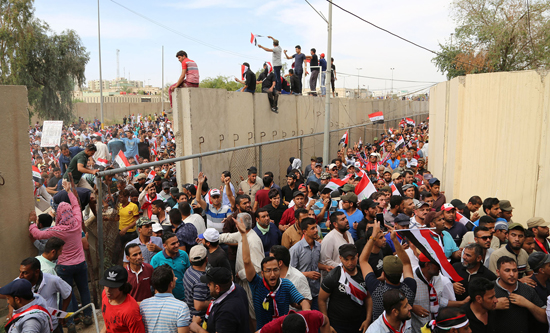
On 30 April thousands of protesters broke through the barriers of the ‘Green Zone’ government compound in central Baghdad, unopposed by police and security forces. For 24 hours the protesters, led by supporters of the Shia cleric and political leader Muqtada Al Sadr, occupied the Iraqi Parliament and surrounding areas, chanting against the corruption of the government and US and foreign involvement in the country. The protesters demanded that the government of Prime Minister Haidar Al-Abadi deliver on promises for reforms to appoint a technocratic government free from corruption and reject the practice of appointing positions and government jobs based on sectarian quotas. A state of emergency was declared in the capital and all gates to the city were closed. This is another step towards the breakdown of the authority of the government in a country in crisis.
The Green Zone is the name given to the heavily fortified compound which has been the location of successive Iraqi government headquarters. It was occupied by the US military in 2003 and became infamous as an island of luxury and wealth in a country collapsing into brutal war and poverty. It is now home to the Iraqi parliament, the US embassy, and to the headquarters of many private security companies. Sadr, who draws his support from mainly working class sections of the Shia population, gained his following through his role in the resistance against the US invasion and occupation. He is interested in putting pressure on the government, but not fundamentally changing it. Stewards from Sadr’s movement joined forces with police and security forces to control and contain the protest. Later, tear gas and live bullets were used, killing two protesters and injuring 60. Sadr is fighting for the political influence of a section of the Iraqi ruling class, with the New York Times explaining his intention ‘to reinsert himself into Iraq’s political mix’ (30 April). However, the actions of his supporters express a more radical opposition to the corrupt and incompetent state which has been built up after the imperialist destruction of the country in 2003.
Sectarian divisions in Iraq have been actively fostered by the imperialist powers. From 1916 when the borders of modern day Iraq were drawn by British and French imperialism, to practices during the 2003 invasion and since to turn religious and ethnic communities against each other, division has been a central imperialist tool for keeping Iraq pliant and weak. Imperialist support for Sunni jihadists helped to develop the Islamic State group (IS), which recently launched suicide bombings in Baghdad which killed more than 200 civilians. The divisions are so deep that there is little chance of the Iraqi state continuing in its current form. A de facto Sunni state has been established by IS in the north-west, and the Kurdistan Regional Government (KRG) in the north-east is pushing for further autonomy. Despite poverty among huge swathes of the country, property prices in central Baghdad are as high as London’s (Japan Times, 11 May). Those with dirty oil money which they cannot get out of the country have found property the safest way to launder it. The state is the biggest employer in Iraq, employing 7 million people at a cost of $4bn a month. However, the fall in oil prices has meant that state oil revenues are now down to $2bn a month, threatening financial collapse.
In a bid to distract attention from the deepening political crisis, the Abadi government launched an assault to retake the central city of Fallujah from IS on 25 May,. US airstrikes and advisors are supporting the assault, despite US imperialism pushing for the Iraqi army to focus on retaking Mosul in the north in support of the KRG. Fallujah, now occupied by around 1,000 IS fighters, and 50,000 civilians, was the site of massacres by the US and British in the 2003 Iraq war. Depleted uranium munitions were used causing what researcher Dr Chris Busby described as the ‘highest rate of genetic damage in any population ever studied’ (The Independent, 23 October 2012). The notoriously weak Iraqi army, supported by stronger Shia militias may be able to retake Fallujah. Whether they will be able to hold territory with mainly Sunni inhabitants in a situation of heightened sectarian tension is unclear. The conditions which have enabled a group like IS to dominate Sunni areas of Iraq will remain. Without a truly democratic process of rebuilding the government, its institutions and economy in the interests of the mass of people in Iraq – free from imperialist interference – divisions and corruption will continue. The continuing protests against imperialism and corruption need to be a step towards such a process.
Toby Harbertson




